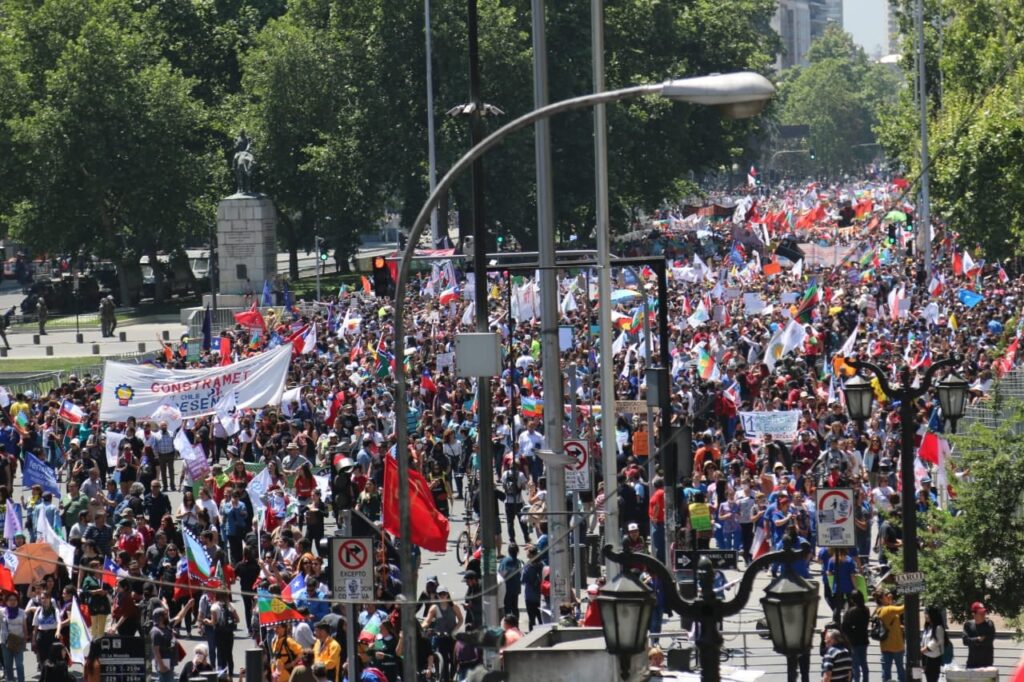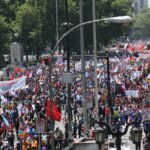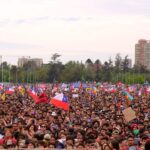Read this article in:
English
31 October, 2019More than a million people took part in the biggest demonstration in Chile since democracy was restored. The protestors are calling for an end to the country’s widespread social inequality, and have been out on the streets every day to make their demands heard.
The rally, which was held on 25 October in Santiago's Plaza Italia, has been dubbed "the biggest demonstration in Chile" on social media. According to official figures from the Santiago Metropolitan Area, more than a million people took part in the rally, which was the culmination of a week of protests.
Protestors are calling for major changes to the country's economic and political systems. They want the constitution, written during Pinochet's dictatorship, to be replaced with one that ensures social justice, and they’re asking for solutions to the deep-rooted problems affecting society.
They've also called for the curfew to be lifted, for the security forces to be taken off the streets and for the violence and killings to end. So far, 20 people have died, 4,271 have been arrested and 1,305 have been injured in the protests.
The march was so successful that even the president of Chile, Sebastián Piñera, said that he had "heard the message". On 27 October, Piñera lifted the state of emergency. He also dismissed his entire cabinet so that he could create a new team that will “represent change and provide leadership as we head into fairer and more united times". In addition, he brought in a raft of measures that include a 20% increase in basic pensions and a higher tax rate for the wealthiest Chileans.
However, many Chileans say these measures are not enough because they will not iron out the inequalities or resolve the problems they face. Their protests and calls for major change will therefore continue.
"The government's package of reforms hardly even scratches the surface. Everything will have to come from people's taxes and not from private companies. The government needs to understand that the underlying struggle is against neoliberalism: we want a fairer society that puts people’s needs before capital. And we want a constituent assembly to be formed in order to create a new constitution that will create a fairer and more equal country,"
said Horacio Fuentes, who is president of IndustriALL’s affiliate, Industrial Chile-Constramet, and a member of IndustriALL's executive committee.
Juan Olguín, president of the Federation of Copper Workers (FTC), also an affiliate of IndustriALL, added:
"The economic model in place since democracy was restored does not take account of social needs, and inequalities have increased. We need a new system that distributes wealth fairly, with more sustainable income for those working in the manufacturing sector.
We think that Chileans are right to protest, because no government has been capable of fostering a socio-political dialogue – there has not been any kind of social democracy in the country. We need a major change in Chile’s economic system. We also have to create a new social pact so that we can all work together to build public policies.”
Another major rally was organized through social media for 29 October, in order to step up the calls for social change. The 70 trade unions and social organizations making up the "social unity" movement held another general strike on 30 October.
Incredible numbers out in the streets of #Santiago & #Chile for the #ChileProtests! #FightInequality: the people of the country with record-levels of inequality have had enough#ChileQuiereCambios #NoEstamosEnGuerra #LaMarchaMasGrandeDeChilepic.twitter.com/pFuB6w2UNk
— ITUC (@ituc) October 26, 2019
Photo credit: CUT Chile


